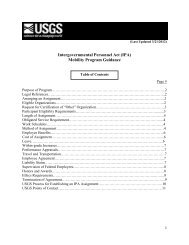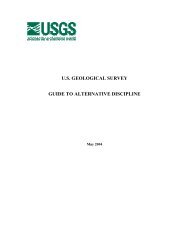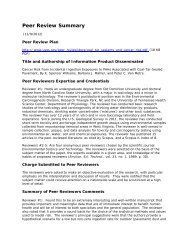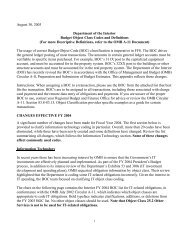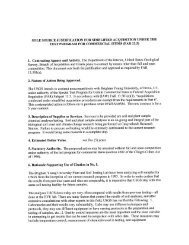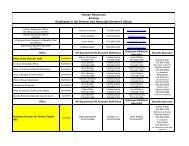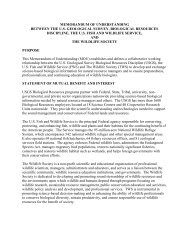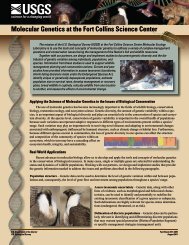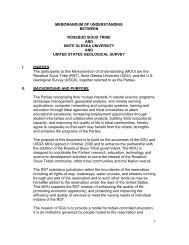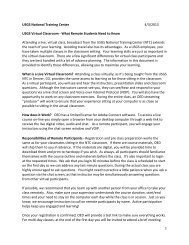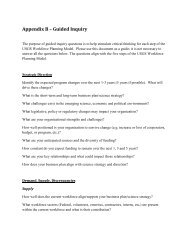1399,Student Trainee (Hydrology),GS-09 PD Tracking ... - USGS
1399,Student Trainee (Hydrology),GS-09 PD Tracking ... - USGS
1399,Student Trainee (Hydrology),GS-09 PD Tracking ... - USGS
You also want an ePaper? Increase the reach of your titles
YUMPU automatically turns print PDFs into web optimized ePapers that Google loves.
<strong>1399</strong>,<strong>Student</strong> <strong>Trainee</strong> (<strong>Hydrology</strong>),<strong>GS</strong>-<strong>09</strong><br />
<strong>PD</strong> <strong>Tracking</strong> Number 0000017<br />
Incumbent of this position serves as a student trainee under the <strong>Student</strong> Career Experience<br />
Program. This program is designed to provide the student with work experience directly related to<br />
their academic field of study and to orient and expose the student to the mission and work of the<br />
U.S. Geological Survey and the benefits and conditions of Federal employment. It provides formal<br />
periods of work and study while the student is enrolled in school, the conditions of which are<br />
outlined in the Working Agreement that must be signed by the student, the school, and the<br />
employing Office.<br />
-<br />
Major Duties<br />
The incumbent of this position is a hydrologist with responsibility for participating on hydrologic<br />
studies of considerable scope and complexity, or serving as a Project Chief for studies that are<br />
more conventional or limited in nature. Project activity typically involves { }.<br />
Plans, conducts, and reports on assigned parts of hydrologic interpretive studies which typically<br />
adhere to established techniques andconventional methods of investigation.<br />
Collects and analyzes hydrologic data relating to one or more of the three disciplinary fields<br />
(ground-water, surface-water, quality-water), determining apparent reasons for data anomalies,<br />
and correlating the wide variety of factors that affect the information presented.<br />
Maintains an awareness and understanding of the latest state-of-the-art techniques,<br />
instrumentation, and technology applicable to the conduct of hydrologic studies and data<br />
collection/analysis activities. Conceives new approaches or modifies existing methods of<br />
collecting, analyzing, and interpreting hydrologic information.<br />
Prepares reports of findings for assigned parts of interpretive studies summarizing the results of<br />
hydrologic investigations.<br />
Participates with higher level project hydrologists in the development of project proposals or<br />
descriptions, which summarize critical information relating to the objective, approach, funding, and<br />
expected results of proposed investigations.<br />
Contacts government, State, or local agencies to obtain data and information necessary for the<br />
conduct of hydrologic studies, or private citizens to obtain landholder permission for access to<br />
study sites.<br />
Directs the work of technicians and lower grade scientists serving as members of project teams in<br />
the collection and analysis of hydrologic information collected.<br />
Operates a motor vehicle as an incidental driver.
-------------------------------<br />
Factor Statements<br />
FACTORS 1 - KNOWLEDGE REQUIRED BY THE POSITION (Level 1-6, 950 points)<br />
- A professional knowledge of scientific hydrologic principles and concepts and a practical<br />
knowledge of conventional hydrologic data collection methods, techniques, and field/lab<br />
equipment sufficient to undertake routine hydrologic investigative projects involving water resource<br />
occurrence, use, and development.<br />
- Knowledge sufficient to interpret the effect and impact of any change in the level or use of water<br />
resources for geographic areas under study.<br />
- A limited knowledge of hydrology-related disciplines such as civi1 engineering, geology, biology,<br />
chemistry, and soil science sufficient to recognize how they relate to water management issues<br />
and to recognize when specialized advice is needed.<br />
- Knowledge of US<strong>GS</strong> and WRD publication requirements and skill in the preparation of reports<br />
which clearly present scientific findings, interpretations, conclusions and recommendations.<br />
FACTOR 2 - SUPERVISORY CONTROLS (Level 2-3, 275 points)<br />
The supervisor outlines program objectives and the material, money, and personnel available for<br />
conducting project studies. The hydrologist, supervisor, and other staff scientists or project team<br />
members consult on coordination of work plans, objectives, and accomplishments, as required.<br />
The hydrologist independently plans the steps and techniques necessary to complete the<br />
assignments in accordance with established hydrologic practices and techniques. Where unusual<br />
or unconventional study conditions are encountered, or where problems require modification of<br />
established methods or procedures, the hydrologist generally discusses the action he/she plans to<br />
take beforehand with the supervisor or project chief, as appropriate. Completed work is reviewed<br />
for technical adequacy and soundness, as well as accomplishment of overall objectives for<br />
assigned project responsibi1ities.<br />
FACTOR 3 - GUIDELINES (Level 3-3, 275 points)<br />
Guidelines are usually applicable and include policy, procedural, and technical manua1s and<br />
handbooks, standard professional practices, published research results and related scientific<br />
reports, annual work plans, and oral instructions from the supervisor or project chief. The guides<br />
do not always address specific sets of problems or circumstances encountered, therefore,<br />
requiring periodic departure from standardized procedures or conventional study approaches for<br />
completion of assignments. The hydrologist, in view of the considerations listed above, must select<br />
from alternative methods or procedures that appear appropriate to the existing situation, and make<br />
or recommend compromises required by technica1 considerations.<br />
FACTOR 4 - COMPLEXITY (Level 4-3, 150 points)<br />
Primary assignments relate to the collection, analysis, and interpretation of hydrologic information<br />
collected in field studies and to the preparation of reports that summarize study findings.<br />
Complicating features encountered in conducting water resources studies typically include:<br />
seasonally varied hydrologic conditions and use of water resources, difficulty in accurately<br />
assessing hydrologic anomalies, a need to vary study approaches to provide for existing<br />
environmenta1 or field conditions, and a lack of adequate and reliable hydrologic data on which to<br />
base interpretive findings and conclusions. Problems associated with project assignments carried<br />
out by the hydrologist are typically addressed in precedent studies and are generally amenable to<br />
the application of standard techniques and practices.
FACTOR 5 - SCOPE AND EFFECT (Level 5-3, 150 points)<br />
The purpose of the work is to investigate and analyze any of a variety of hydrologic problems and<br />
to provide or recommend a1ternatives for water resources planning, management, and decisionmaking.<br />
Results of the work can potentially affect the quantity or quality of water available for use<br />
in loca1 areas and the socio-economic well-being of dependent communities and industries. Study<br />
procedures, techniques, or results may also serve as a basis for similar hydrologic assignments or<br />
studies carried out by other hydrologists.<br />
FACTOR 6 - PERSONAL CONTACTS (Level 6-2, 25 points)<br />
Contacts are primarily with technicians and other hydrologists in the immediate office and with<br />
specialists at higher levels within the organization. Some contacts are with state agency scientists<br />
and local officials as well as with landowners, the general public, and contract personnel.<br />
FACTOR 7 - PURPOSE OF CONTACTS (Level 7-2, 50 points)<br />
Contacts are for the purpose of planning and coordinating work efforts with co-workers; to provide<br />
and obtain advice regarding study problems; to ensure correctness of study methodology<br />
employed; for compliance with cooperative agreements; and to reconcile conflicting technical<br />
viewpoints and ideas.<br />
FACTOR 8 - PHYSICAL DEMANDS (Level 8-2, 20 points)<br />
The work requires frequent physical exertion while conducting field portions of project work and<br />
with inspection of ongoing operations, including walking over rough, rocky, or uneven terrain; lifting<br />
and carrying equipment and supplies; and wading in streams in all types of weather.<br />
FACTOR 9 - WORK ENVIRONMENT (Level 9-2, 20 points)<br />
The work involves some degree of risk when conducting on-the-ground assessment of operations<br />
as well as exposure to moderate discomfort from such extremes as heat, cold, and inclement<br />
weather.<br />
TOTAL POINTS - 1915<br />
GRADE CONVERSION - <strong>GS</strong>-<strong>09</strong><br />
<strong>GS</strong>-1300, Job Family Standard for Professional Physical Science Work, 10/97<br />
Introduction to the Position Classification Standards<br />
Primary Standard<br />
(Source Document Std <strong>PD</strong> S0230)


